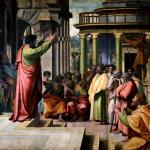He said of Pambo that Abba Anthony used to say of him, ‘Through fearing God, he caused the spirit of God to dwell in him.’[1]
This statement comes from the Sayings of Poemen, the Shepherd, who seems to have been close to the author or editor of the Sayings of the Desert Fathers for the sayings of Poemen seem to account for one-seventh of the whole collection. Poemen recounted what St. Anthony said of Pambo, a famous Egyptian monk who went from illiterate ascetic to educated priest and later was considered one of the great masters of the desert by St. Jerome. Thus, this saying is about how and why Pambo was able to become such a great monk, a great and holy priest, respected by many including Jerome, Melenia, and Athanasius. It was, as Anthony suggested, because he feared God, that is, Pambo did not look for himself and his reputation, nor what men or women had to say of him; rather, he was concerned to follow what God expected of him and kept what he knew of this expectations in the forefront of his ascetic activity. Because he was so open to God, looking to follow the will of God over his own, he was open to the grace of the Holy Spirit. Not only was he found walking with God, doing as God willed, but he became filled with the Holy Spirit and could be said to be a Spirit-bearer, bringing the grace of the Spirit to others, sharing it with them out of his holy love.
The fact that those who went into the desert did so not only to correct themselves, to do penance, or to flee from the world for one reason or another, but to become spirit-bearers, to be filled by the Holy Spirit so that they could manifest God’s holiness to the world, is often forgotten. We tend to think of the desert monk as a wise man who had, through thick and thin, learned the hard lessons of life, realized the difficulty of holiness and so followed, almost to a legalistic end, the moral expectations placed upon them so that they could be seen as holy men of God. While, it is true, in their training they often had to follow rigorous discipline, and they thoroughly learned the expectations of the ascetic monk that what they acquired stayed with them throughout the rest of their lives, such discipline was not their goal; their sayings, again and again, demonstrate that holiness is more than a thing of mere rules, but of prudential wisdom, and to follow the path of holiness requires an acceptance of the personal, subjective dimension of holiness, realizing the need for mercy over rules, and the power of the Spirit to overcome the flaws which otherwise cannot be overcome.
The desert monks were true spiritual masters, speaking of, in, and from the enthusiasm the Spirit had given to them. Their role as spirit-bearers manifested itself in all kinds of spiritual charisms. It was because of this that many monks faced temptations to spiritualizing their lives too much, neglecting the incarnational aspect of the Christian life; they became, as it were, so engaged in the Spirit, so concerned about the charisms of the Spirit, that the sacramental life became lost to them (which is how and why many great ascetics got caught up with and influenced by Messalianism with its denial of the need for or efficacy of the sacraments). The Spirit and Christ go hand in hand as two revealing-arms of the Father; both are needed. A Christian needs a harmonious balance between the two, embracing both for without both one has neither. Thus all Christians, including monks, need a realistic, down-to-earth, incarnational spirituality which grounds them to material creation instead of trying to gnostically ascend beyond it.
This can be seen in how Anthony affirmed the goodness of the body while stating it must be holistically united with the soul, so that instead of the body blindly directing us with its passions, it could be reasonably engaged by spiritual principles, drawing the two together as one; but, he was also clear, it is not just the body, but the soul, which has passions that need to be disengaged, as he taught that spiritual sins, like pride, envy, hatred, all come from the soul and show the body is not alone in needed to be tempered and properly directed.[2]
The fear of God helps us guide ourselves, both in soul and in body, to direct our ways so that the inordinate passions of either of them do not gain complete control over us and our will. We should look upon and reflect upon the desire of God and seek to follow it for ourselves. As we grow in grace, out of love we will fear to disappoint the desires of God. The Spirit will see the love, and dwell with us, causing us great joy, which will help make the love grow stronger. It will become, as we bear more and more of the Spirit, like a fiery fire within which radiating the grace and love of God to all who come in contact with us even as we feel and sense the presence of the Spirit of God within us. Thus, Anthony in a letter, explained:
My dear children, I pray that this may not be a toil to you, and that you may not grow weary of loving one another. Lift up your body in which you are clothed, and make it an altar, and set thereon all your thoughts, and leave there every evil counsel before the Lord, and lift up the hands of your heart to Him, that is, to the creator Mind, and pray to God that He may grant you His great invisible fire, that it may descend from the heaven and consume on the altar all that is on it, and that all the priests of Baal, who are the contrary works of the enemy, may fear and flee from your face as from the face of Elijah the prophet. And then you will see a cloud ‘like a man’s hands’ over the sea, which will bring you the spiritual rain, which is the comfort of the Comforter Spirit. (Cf. 1 Kings 18:38-44).[3]
Pambo, in his holiness, took this to heart; even though he had ascended in earthly knowledge and sacramental orders, he did not let the Spirit become squashed by pride and vainglory. He remained humbled, he acknowledged his deficiencies, never claiming to know the proper interpretation of Scripture, as can be seen in the way he kept silent when people asked his opinion of a difficult text.[4] The Spirit burned bright in him, so that truly, its presence was known similar to the way it was with Moses, as a bright glorious light which shone the merciful grace of God. But this is because, like Moses, like Anthony, like so many great men and women of God, he did not fear what others thought of him, but only God, and that fear was the fear of a lover not wanting to offend his beloved, God.
[Image=Pambo by unknown Orthodox Christian painter (Eastern Orthodox Church) [CC0, Public domain or Public domain], via Wikimedia Commons]
[1] The Sayings of the Desert Fathers. trans. Benedicta Ward (Kalamazoo, MI: Cistercian Publications, 1984), 177.
[2] See St. Antony, The Letters of St. Antony the Great. trans. Derwas J. Chitty (Fairacres, Oxford: SLG Press, 1991), 5 [Letter I].
[3] St. Antony, The Letters of St. Antony the Great, 21 [Letter VI].
[4] See The Sayings of the Desert Fathers, 197 (Saying 9).
Stay in touch! Like A Little Bit of Nothing on Facebook













